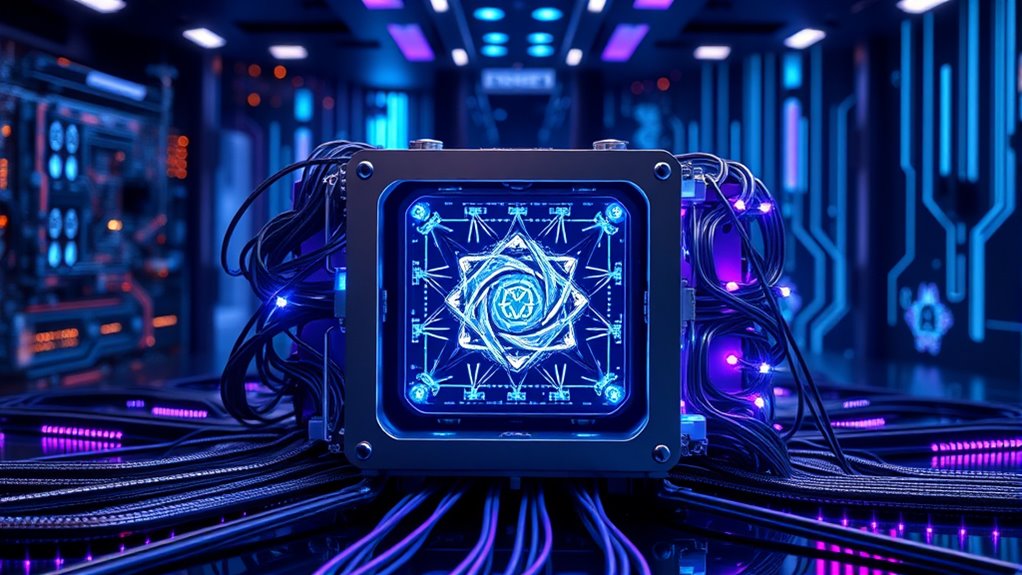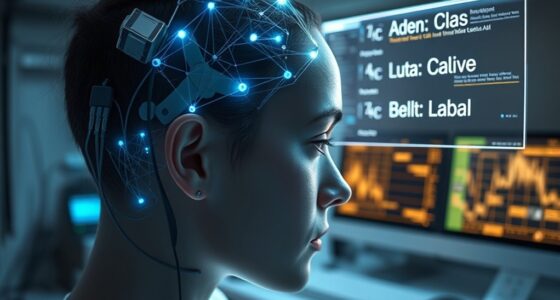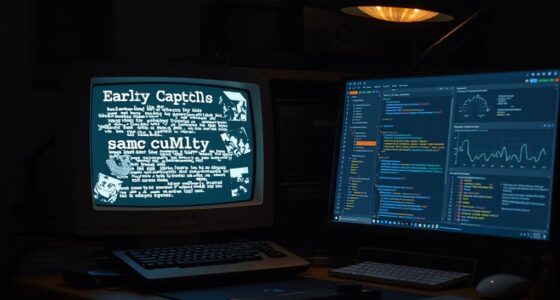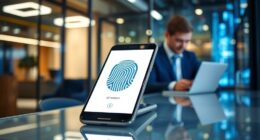Quantum computing uses the strange phenomena of superposition and entanglement to perform calculations that far surpass classical computers. Superposition lets qubits be in multiple states at once, while entanglement links qubits so they instantly reflect changes together. This combo enables quantum systems to process many possibilities simultaneously, leading to exponential speedups for certain problems. If you’re curious, exploring further reveals how these quantum tricks could revolutionize technology and solve problems once thought impossible.
Key Takeaways
- Quantum computing uses superposition and entanglement to perform complex calculations exponentially faster than classical computers.
- Superposition allows qubits to represent multiple states simultaneously, enabling parallel processing of all possible solutions.
- Entanglement links qubits so their states are interconnected, increasing computational power and enabling unique quantum algorithms.
- Practical quantum systems face challenges like decoherence, which threaten the stability of delicate quantum states.
- Quantum breakthroughs could revolutionize cryptography, drug discovery, optimization, and simulate complex systems beyond classical capabilities.

Have you ever wondered how quantum computers are poised to revolutionize technology? At the core of their incredible power are concepts like superposition states and entanglement phenomena. Unlike classical bits that are either 0 or 1, quantum bits, or qubits, can exist in multiple states simultaneously thanks to superposition states. This means a qubit can be 0, 1, or both at once, allowing quantum computers to process an immense number of possibilities simultaneously. It’s this ability that makes them so promising for solving complex problems far beyond the reach of classical computers. But superposition alone isn’t enough; entanglement phenomena take this to another level. When qubits become entangled, their states become intrinsically linked, regardless of the distance separating them. Change one entangled qubit, and the other instantly reflects that change, creating a network of interconnected information. This phenomenon is what enables quantum computers to perform certain calculations exponentially faster, especially in areas like cryptography, optimization, and simulation.
Imagine working on a problem where, instead of testing each solution one by one, your quantum computer explores all possibilities at once. That’s the power of superposition states combined with entanglement phenomena. It’s like having a supercharged brain that can consider every angle simultaneously, then collapse into the best answer once measured. This capability pushes the boundaries of what’s computationally feasible today, opening doors to breakthroughs in medicine, materials science, and artificial intelligence. Quantum algorithms leverage these phenomena, harnessing the weirdness of quantum mechanics to outperform classical algorithms on specific tasks. But mastering superposition and entanglement isn’t easy; they’re delicate, prone to decoherence—where environmental noise destroys quantum information. That’s why building stable, scalable quantum systems remains a significant challenge.
As researchers continue to explore and refine quantum principles, the potential applications grow more exciting. Quantum computers could crack encryption methods that keep our data safe today, simulate molecules for new drugs, or optimize complex logistics networks in ways we can barely imagine. The strange, counterintuitive behaviors of superposition states and entanglement phenomena are what make all this possible, transforming computing from a mere tool into a revolutionary technology. Understanding the fundamental principles behind superposition and entanglement is essential for advancing quantum technology. So, when you think about the future, remember that it’s these quantum weirdnesses that hold the key to opening unprecedented capabilities. And as scientists investigate deeper into understanding and controlling these phenomena, your world could be about to change in ways we once only dreamed of.
Frequently Asked Questions
How Does Quantum Entanglement Differ From Classical Correlation?
You might wonder how quantum entanglement differs from classical correlation. In quantum nonlocality, entangled particles stay connected regardless of distance, meaning measuring one instantly affects the other, no matter how far apart. Classical correlation, by contrast, involves predictable relationships based on shared history. Entanglement measurement reveals this nonlocal connection, which can’t be explained by classical physics, making it a fundamental difference in how particles relate across space.
What Are the Main Challenges in Building Scalable Quantum Computers?
Building scalable quantum computers faces several challenges, like quantum decoherence, which causes qubits to lose their quantum state quickly, and maintaining high qubit fidelity, so computations stay accurate. You need to manage fragile qubits in complex environments, preventing errors from noise and interference. Overcoming these hurdles involves improving qubit stability, error correction techniques, and developing better hardware to guarantee reliable, large-scale quantum processing.
Can Quantum Computers Run All Types of Algorithms Faster?
Sure, quantum computers can run many algorithms faster, but don’t get your hopes up. They still struggle with quantum error correction and maintaining qubit coherence, which slows down progress. Not every algorithm benefits from quantum speedup, especially those suited for classical computers. So, while quantum tech is exciting, it’s not yet the universal solution for all computing challenges. Patience, your quantum revolution is still a work in progress.
How Secure Is Quantum Encryption Compared to Traditional Methods?
You might wonder how secure quantum encryption is compared to traditional methods. Quantum key distribution offers a high level of encryption security because any eavesdropping attempt disturbs the quantum states, alerting you to potential breaches. Unlike classical encryption, which can be cracked with enough computing power, quantum encryption leverages the laws of physics, making it incredibly difficult for hackers to intercept your quantum key without detection.
When Will Quantum Computing Become Mainstream Technology?
It’s fascinating how the timing of quantum computing going mainstream seems tied to breakthroughs in quantum hardware and software. Coincidentally, as researchers develop more stable quantum hardware and user-friendly quantum software, you’ll see wider adoption. Experts predict this could happen within the next decade, but widespread use depends on overcoming significant technical challenges. So, stay tuned—your future might include quantum-powered innovations sooner than you think.
Conclusion
So, next time you hear “quantum computing,” imagine a tiny wizard juggling multiple flaming torches at once—only instead of flames, it’s qubits spinning in superposition, making your laptop look like a typewriter. Sure, it’s complex, but isn’t it comforting to know that someday your coffee might be brewed by a machine that’s basically a cosmic chaos magician? Welcome to the future—where the impossible is just a quantum leap away.










